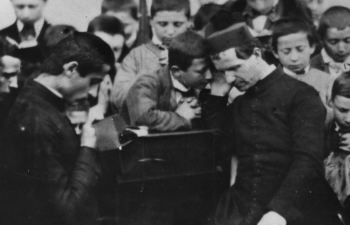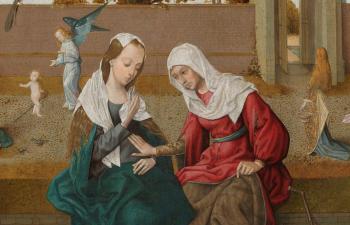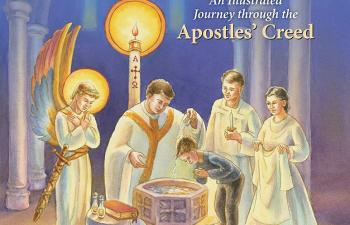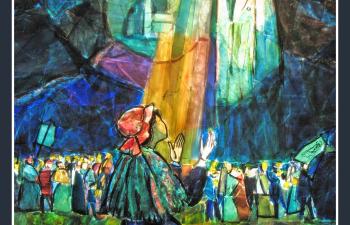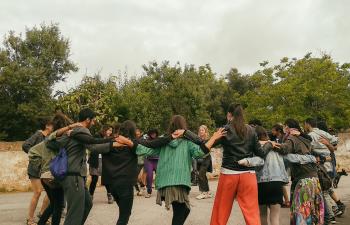John tells the story this way: There was a wedding in Cana. Mary was there as a guest. So was Jesus, her Son. So were His first disciples. Mary noticed that the wine was running short, a terrible embarrassment to the hosts of the wedding. In going to her Son, Mary simply said: ‘They have no wine.’ Imagine Jesus looking at her deeply, accompanied with a bit of a sigh. ‘How does this concern me? My hour has not yet come.’ The best was yet to come. Mary’s response. She said nothing. She found the wine servers. She pointed back to her Son. She said: ‘Do whatever he tells you.’ And that was her exit out of the story. She left it up to her Son Who instructed the servers to fill the large stone jars with water. That water became the good wine. That good wine was the beginning of the signs and wonders that ‘revealed His glory’ to the world, even and especially to this day. John’s story of the Wedding Feast of Cana is like peeling an onion. There are so many layers, ever so delicate and unique that we can gather from this chapter of Scripture. The story of the wedding at Cana speaks of the critical nature of the marriage covenant between a man and woman, so critical that it becomes that point when the ministry and miracle of Jesus are publicly revealed. This story speaks volumes in a day and age where marriage is being defined away as nothing important at all. But this story also underscores the deep relationship of Christ to His Church, a lesson which comes alive in those few short verses. The symbol of the Church as bride and Jesus as spouse is an enduring theological image.
Do whatever He tells you
But let me lift just one verse at face value, not trying to read anything deeper into it than the lines on a page: ‘Do whatever He tells you.’ Again, ‘Do whatever He tells you!’ There is no more concise job definition of the catechist than this ‘job description’ given to us by the Blessed Mother, the first catechist. That job has as its all—to teach, to nurture and to evangelize – the deep relationship between Jesus, the Bridegroom and His Bride, the Church. All this boils down to a very simple imperative from the lips of Mary, our model for catechesis: ‘Do whatever He tells you.’ The ministry of catechists is not to present ‘my’ interpretation of Jesus, or ‘my’ take on Jesus, or ‘my’ cultural opinion of Jesus locked in ‘my’ own time and day. The ministry of catechists is not to introduce theories and conjecture, musings or philosophies, best-selling books or popular tracts. The ministry of catechists is to remain faithful to Jesus and His teachings—the Deposit of our Faith—as both an open embrace and an open exchange of Mary’s charge, ‘do whatever He tells you.’ A catechist is to present Jesus fully and completely as He has been presented by the Magisterium of the Church since the days of the Apostles. The catechist does so by never oversimplifying but, at the same time, not making this mission too complicated. Like some of you, I am from the last generation who ‘learned’ the faith through the Baltimore Catechism. That text outlined the doctrine and traditions of the Church that allowed my peers and me to come to know the Catholic faith inside and out. When the Baltimore Catechism was ‘retired,’ catechesis unfortunately became oversimplified. Truths of the faith became unknown and believers became uninformed. Oversimplifying catechesis makes the awesome nature of faith appear ordinary, if not even shallow. In an informal survey a few years back, young Catholics were asked what it meant to be a Catholic, what it meant to them to live out their faith each day. One fellow responded that what he does to live his faith is to ‘smile a lot!’ No doubt that was the answer of a generous soul. But some days are not for smiling; and we need a faith built on firmer soil than a grin. ‘Dumbing down’ the faith to a few common denominators won’t move mountains and won’t inform souls. A faith to last a lifetime needs more than clichés. At the same time, we have to beware of the almost Gnostic tendency to present the faith in such a complicated package that it can be perceived as esoteric—the private knowledge of ‘intellectuals’ smart enough to grasp it. We can never forget that while the glories and mysteries of the faith can be studied for a lifetime, faith itself is always lived from one single moment to the next. The faith is found in that concise instruction of the Blessed Mother: ‘Do whatever He tells you.’
Rivers of faith, rivers of love
I’m reminded of the Curé of Ars encountering a man in his little church. Every day he would come in and sit for awhile, then leave. The Curé finally asked him what he was up to. The man said that He was visiting Christ in the Blessed Sacrament. ‘And then what do you do?’ the Curé asked. ‘I look at Him,’ the man responded, ‘and He looks at me.’ A whole lot of catechesis is wrapped up in that simple and single statement. I don’t mean in any way to denigrate study. To the contrary, if we do not know the faith well, we cannot pass it on to the next generation. One of our greatest aches as a Church over the past few decades is that the faith has not been passed on in all its richness and beauty. To be perfectly frank, and in many instances, the faith had not really been taught for several decades. We have learned—much to our sadness and much to our chagrin—how much is lost if catechesis is weak and content is flawed. Passing on the richness of our Catholic faith cannot become a matter of lifeless content. The Apostles passed on a faith very much alive! We want those to whom we pass on this eternal gift of faith to understand that they are called ‘to do whatever He tells you.’ This faith is not rocket science, the privileged knowledge of a few. This faith is a personal encounter with the Master Teacher Himself. The faith that moves us to tears of joy is not abstract principles. The faith is in the love of the Jesus who has died, is risen and will come again. This is the faith that the Blessed Mother asks that we model in catechesis. To use the word ‘catechize’ is to teach of Christ and His Body, the Church. To catechize naturally flows from the Eucharist and the call to evangelize. The celebration of the Eucharist is the sine qua non of all catechesis and the key to all evangelization. Any model of catechesis will fall short unless we ensure that the faith taught is a faith that transforms, a faith lived, drawn from the action of the Eucharist Itself and the change that happens in evangelization. Our mission is fidelity to the faith, fidelity to Jesus, which Mother Teresa defined as ‘a matter of living my faith one day at a time, one person at a time.’ That is the faith we want to pass on. That is the faith alive; that is the Church alive in our generation with which we catechize the generations after us. In his apostolic letter, Tertio Millennio Adveniente, Pope John Paul II wrote that ‘the whole of Christian history appears to us a single river, into which many tributaries pour their waters … the river of revelation, of Christianity and of the Church, a river which flows through human history starting from the event which took place at Nazareth and then at Bethlehem two thousand years ago’ (25). The river of God’s love flows through our Church today. The great river of faith, hope and love is what sustains us in our pilgrimage to God’s kingdom. The Holy Spirit has given each of us the gifts to teach, to breathe new life in each generation of the Church. That is the mission that we accept as catechists. We do so by reflecting the humility of the Blessed Mother, the Handmaid of the Lord, the first and model catechist. We do so by reflecting the strength and the determination of the Blessed Mother at the wedding feast of Cana who could speak those words of commendation to every catechist: ‘Do whatever He tells you.’ This article is originally found on pages 12-13 of the printed edition.
This article is from The Sower and may be copied for catechetical purposes only. It may not be reprinted in another published work without the permission of Maryvale Institute. Contact [email protected]



